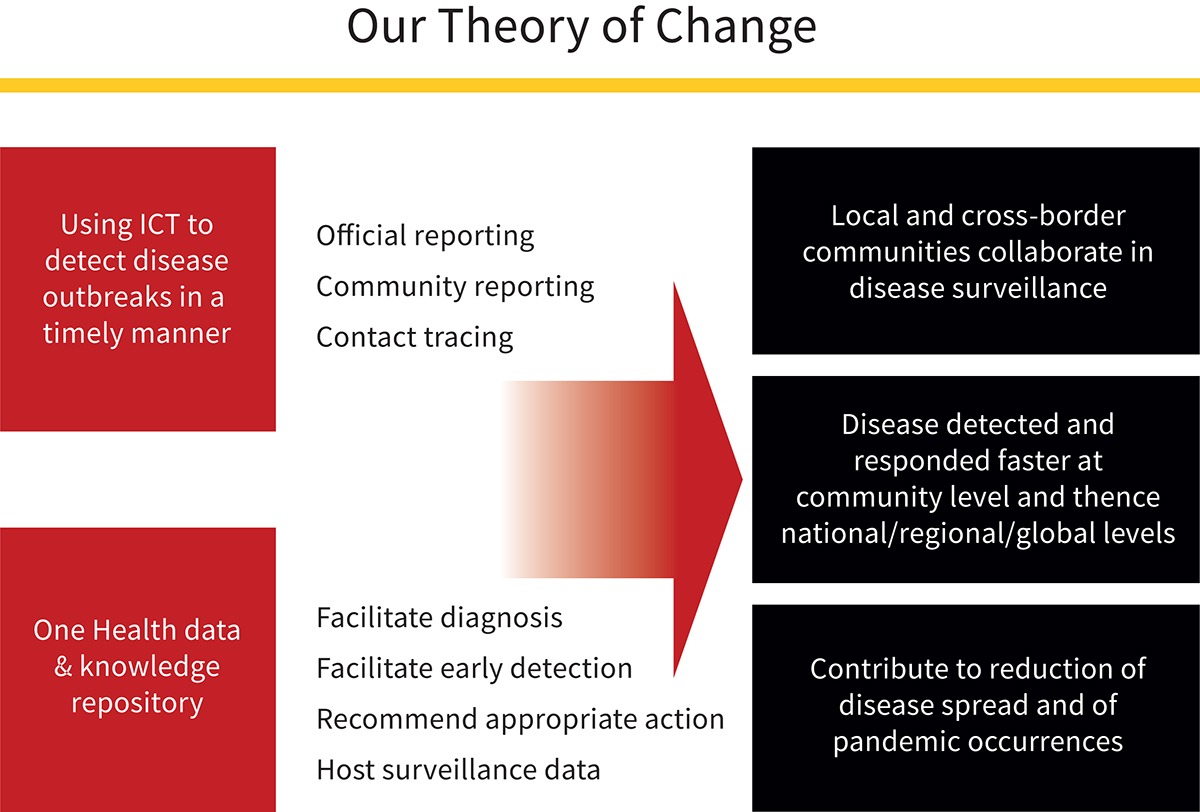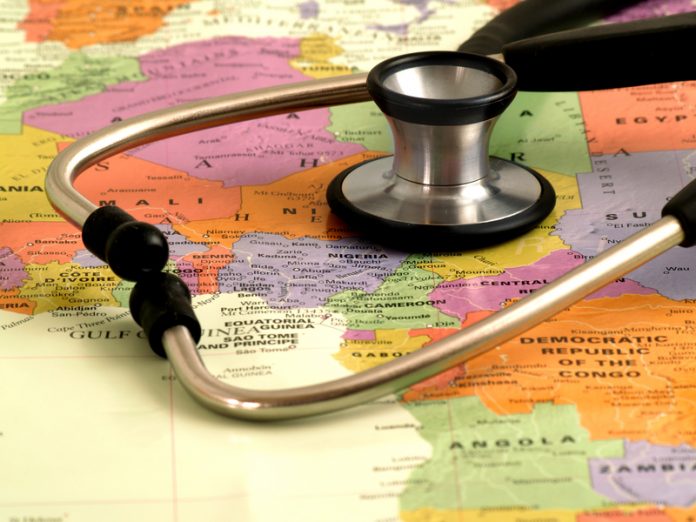Researchers from SACIDS Foundation for One Health discuss the importance and implementation of event-based community surveillance using a One Health approaches in East and Southern Africa
The Sokoine University of Agriculture in collaboration with the National Institute for Medical Research through the SACIDS Foundation for One Health has developed and deployed a digital technology branded AfyaData to enhance community-based disease outbreak early detection and prompt response in East and Southern Africa. This work, funded by the Ending Pandemics, is led by the One Health Sciences Community of Practice (OHS CoP) Coordinator, Professor Esron Daniel Karimuribo. The CoP operates under four pillars namely: One Health surveillance systems; Ecosystem Health; One Health Policy; and Agri-Health systems.
The growing body of evidence shows that about three-quarters of human infectious diseases have an animal origin. This observation suggests that One Health approach is considered to be the most effective strategy for managing infectious diseases and the associated risks. Scanning through the event-based surveillance systems in human and animal health sectors in Tanzania, we learnt that the systems faced some challenges including inadequate engagement of community, untimely capturing and submission of reports on health events from the primary sources, lack of feedback loops, difficulty in contact tracing and intra- and inter-country inadequate inter-sectoral information sharing. We have observed that disease outbreaks typically erupt at a community level and hypothesised that community-based participatory disease surveillance could enhance early detection, timely reporting and prompt control. Furthermore, we have realised that most vulnerable communities are located in hard to reach areas with poor infrastructure, which motivated us to think about the fit-for-purpose innovative approaches to strengthen event-based surveillance (EBS) in Tanzania and beyond.

Our approach
Participatory event-based surveillance (EBS) is driven by our theory of change summarised in figure 1, to work across human and animal health sectors to fight disease epidemics, to develop ICT tools to support data capture, reporting and feedback at health facility and within the community (feed into the official national human and animal health information systems), and to strengthen cross border collaboration to fight epidemics in shared ecosystems. We seek to link the EBS data from community to district, regional (provincial), national and global scales.
About AfyaData
AfyaData is an open source digital disease surveillance tool that eases the collection, analysis, documentation and feedback of public/animal health events. It is a set of two applications – a mobile Android based client and a web-based application acting as a server. The mobile client is used for collecting and submitting surveillance data, and receiving and/or tracking feedback from various levels. The server component caters for data storing/hosting and management.
How it was designed
AfyaData was designed in 2010 as a collaborative partnership between SACIDS and ministries responsible for human and animal health in Tanzania. Collaborative designing was extended to regional animal and human health epidemiologists, Information, Communication and Technology (ICT) specialists and community representatives through EpiHack event convened in Arusha, in December 2014, which was attended by 66 specialists (medical, veterinary and ICT programmers) from 14 countries.
Basic configuration of AfyaData
Its basic configuration comprises four strands namely (a) strictly human diseases, (b) strictly animal diseases, (c) diseases transmissible between animals and humans (zoonoses), and (d) specific disease active surveillance/ vertical system.
How it functions
AfyaData toolset has the capability to manage entire data collection lifecycle, from managing users, loading forms, collecting data in the field, sending collected data to a server, and viewing data on the server and providing feedback to data collectors and/or persons of interest. The app is designed to collect georeferenced data online or offline in locations without internet and data can be submitted later when one is at a location with internet. It supports prompt analysis, visualisation and presentation of data in different formats including graphs and maps. Its dashboard provides a quick overview and reflections of the programme trend/achievement in intervention strategies/measures. It can integrate data from multiple sources and is enhanced with an early warning short message service for notification to decision makers on health events through their mobile phones.
AfyaData is powered by One Health Knowledge Repository (OHKR), which is a decision-making system with expert-authored content that helps to support the prediction of likely disease conditions based on the reported signs and symptoms. It can be used for sample tracking and communication of test results between different points/sections of the health care delivery system using barcode feature. It supports multiple languages and can be customised based on different clients’ needs including language, surveillance, data integration needs.
AfyaData deployment strategy
Prior to its deployment in the selected areas, consultative meetings were held with ministries responsible for human and animal health and the President’s Office Regional Administration and Local Government in Tanzania to identify the specific needs and agree on the areas and deployment strategy. From the national level, we the consulted district officials responsible for human and animal disease surveillance and draw up the specific area deployment strategy based on the identified local needs. The local leaders and officials working in human and animal health sectors at the community level were actively engaged in the identification and recruitment of Community Health Reporters (CHRs) who were subsequently trained on the use of AfyaData in EBS.
Scope of AfyaData deployment
Between March 2017 and December 2018, the focus has been on the rolling out of AfyaData using One Health disease surveillance model to support capture of health events in human and animal populations and their environment at a community level in selected areas. So far the rolling out has been completed in Kilosa, Malinyi, Ulanga, Ngara and Wete districts of Tanzania. During the period AfyaData was used to enhance capture of cholera suggestive cases and environmental risk factors, as well as sharing of laboratory results between different points/sections of the health care delivery system. This was implemented using a specific cholera surveillance model in selected areas, which included Morogoro Urban, Mvomero, Kilosa, Kinondoni and Temeke districts of Tanzania.
Afyadata has been used to support official animal disease surveillance in selected areas in Tanzania. It has been used to collect information of the health status of animals at slaughter houses/premises in selected areas.
There are currently over 460 users of AfyaData at community level in Tanzania. Moreover, AfyaData has been used to collect baseline data on the functionalities of event-based surveillance in the communities of selected cross-border ecosystems in East Africa to inform the strengthening strategies between the countries. Within the next 18 months we plan to roll out AfyaData to others areas of Tanzania and neighbouring countries to enhance linkage of health events from community to the formal disease surveillance systems.
AfyaData has been introduced to the Ministry of Health of the Democratic Republic of Congo to support surveillance of Ebola Virus Disease (EVD). The training of trainers and the digitization of various surveillance forms to be used in EVD monitoring and evaluation have been conducted. Plan is in place to deploy AfyaData at community level and other potential levels in DRC.
We have initiated collaboration with the Food and Agriculture of the United Nations (FAO) and Ministry of Livestock and Fisheries in Tanzania to link data being collected from community level using AfyaData with EMA-I (an FAO disease surveillance tool deployed at district level). This collaboration strategy heightens the linkage of health events from community level to global level. In addition, we have successfully put up a proposal to support Africa CDC surveillance; an initiative that will enhance event-based surveillance in 55 Africa CDC member countries.
Data access
The collected data are strictly kept confidential and accessed near to real-time and owned by the relevant authorities (Ministries of Health, Livestock and Local Government Authority and others as defined by the relevant authority) through specific access code. AfyaData enhances linkage of human and animal health events from community level to district, national, regional and global levels.
Authors and affiliation: By Professor Esron D. Karimuribo, Dr. Calvin Sindato, Dr. Leonard E.G. Mboera and Eng. Eric Beda. The SACIDS Foundation for One Health, Sokoine University of Agriculture, Tanzania.
“SACIDS Foundation for One Health” against “Southern African Centre for Infectious Disease Surveillance (SACIDS) Secretariat”.
Please note: This is a commercial profile
Professor Esron D. Karimuribo
Coordinator
One Health Sciences Community of Practice
Dr. Calvin Sindato
One Health Epidemiologist
Dr Leonard E.G. Mboera
Coordinator
Emerging and Vector-Borne Disease
Community of Practice
Eng. Eric Beda
Regional ICT Specialist
Sokoine University of Agriculture
P.O. Box 3297, Chuo Kikuu, MOROGORO, Tanzania












